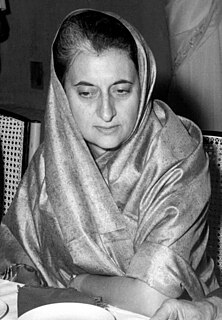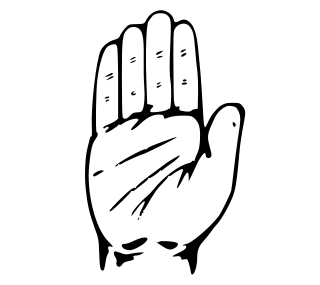Related Research Articles

Indira Priyadarshini Gandhi was an Indian politician and a central figure of the Indian National Congress. She was the first and, to date, only female Prime Minister of India. Indira Gandhi was the daughter of Jawaharlal Nehru, the first prime minister of India. She served as prime minister from January 1966 to March 1977 and again from January 1980 until her assassination in October 1984, making her the second longest-serving Indian prime minister after her father.

The Indian National Congress is a political party in India with widespread roots and also is one of two major political parties in India along with Bharatiya Janata Party. Founded in 1885, it was the first modern nationalist movement to emerge in the British Empire in Asia and Africa. From the late 19th century, and especially after 1920, under the leadership of Mahatma Gandhi, Congress became the principal leader of the Indian independence movement. Congress led India to independence from Great Britain, and powerfully influenced other anti-colonial nationalist movements in the British Empire.

Sonia Gandhi is an Indian politician. She is the president of the Indian National Congress, the left-of-centre political party, which has governed India for most of its post-independence history. She took over as the party leader in 1998, seven years after the assassination of her husband, Rajiv Gandhi, a former Prime Minister of India, and remained in office for twenty-two years.

Rahul Gandhi is an Indian politician who served as the President of the Indian National Congress from 16 December 2017 to 3 July 2019. A member of the Indian Parliament, Gandhi represents the constituency of Wayanad, Kerala in the 17th Lok Sabha. Gandhi is a member of the Indian National Congress and the chairperson of the Indian Youth Congress and the National Students Union of India. He is also a trustee of Rajiv Gandhi Foundation and Rajiv Gandhi Charitable Trust.

Morarji Ranchhodji Desai was an Indian independence activist and served between 1977 and 1979 as the 4th Prime Minister of India and led the government formed by the Janata Party. During his long career in politics, he held many important posts in government such as Chief Minister of Bombay State, Home Minister, Finance Minister and 2nd Deputy Prime Minister of India.

The Janata Party was an amalgam of Indian political parties opposed to the Emergency that was imposed between 1975 to 1977 by Prime Minister Indira Gandhi of the Indian National Congress. In the 1977 general election, the party defeated the Congress and Janata leader Morarji Desai became the first non-Congress prime minister in independent modern India's history.
The Indian National Congress (Organisation) or Congress (O) was a political party in India formed when the Congress party split following the expulsion of Indira Gandhi.

The Congress Working Committee (CWC) is the executive committee of the Indian National Congress. It was formed in December 1920 at Nagpur session of INC which was headed by C. Vijayaraghavachariar. It typically consists of fifteen members elected from the All India Congress Committee. It is headed by the Working President.

The history of independent India began when the country became an independent nation within the British Commonwealth on 15 August 1947. Direct administration by the British, which began in 1858, affected a political and economic unification of the subcontinent. When British rule came to an end in 1947, the subcontinent was partitioned along religious lines into two separate countries—India, with a majority of Hindus, and Pakistan, with a majority of Muslims. Concurrently the Muslim-majority northwest and east of British India was separated into the Dominion of Pakistan, by the partition of India. The partition led to a population transfer of more than 10 million people between India and Pakistan and the death of about one million people. Indian National Congress leader Jawaharlal Nehru became the first Prime Minister of India, but the leader most associated with the independence struggle, Mahatma Gandhi, accepted no office. The Constitution adopted in 1950 made India a democratic country, and this democracy has been sustained since then. India's sustained democratic freedoms are unique among the world's newly independent states.

Raj Narain was an Indian freedom fighter and politician. He won in a famous electoral malpractice case against the then Prime Minister Indira Gandhi, which led to her disqualification and imposition of Emergency in India in 1975. He defeated Indira Gandhi during the 1977 Lok Sabha elections.

India held general elections to the 5th Lok Sabha in March 1971. This was the fifth election since independence in 1947. The 27 Indian states and union territories were represented by 518 constituencies, each with a single seat. Under the leadership of Indira Gandhi, the Indian National Congress (R) led a campaign which focused on reducing poverty and won a landslide victory, overcoming a split in the party and regaining many of the seats lost in the previous election.

In a major turn of events, the ruling Congress lost control of India for the first time in independent India in the Indian general election, 1977. The hastily formed Janata alliance of parties, opposed to the ruling Congress party, won 298 seats. Morarji Desai was chosen as the leader of the alliance in the newly formed parliament and thus became India's first non-Congress Prime Minister on 24 March. The Congress lost nearly 200 seats. Prime Minister Indira Gandhi and her powerful son Sanjay Gandhi both lost their seats.

The fifth legislative assembly election of Tamil Nadu was held in March 1971. Dravida Munnetra Kazhagam was re-elected, after its first victory under the leadership of C N Annadurai in 1967. This was the first time M. Karunanidhi, contested as the leader of DMK party won the election, since he assumed Chief Ministership for the first time, after the death of C N Annadurai. Karunanidhi had emerged successfully in the leadership crisis with other party leaders M. G. Ramachandran, and Nedunchezhiyan, which ensued after the death of C. N. Annadurai. The main opposition party in the election was Indian National Congress (Organisation) led by K. Kamaraj, whereas the Indian National Congress (Indira) faction aligned with Dravida Munnetra Kazhagam.

Elections in Tamil Nadu are conducted every five years to elect the State assembly and its share of members to the Lok Sabha. There are 234 assembly constituencies and 39 Lok Sabha constituencies. The state has conducted 15 assembly elections and 16 Lok Sabha elections since independence.
The Janata Morcha was a coalition of Indian political parties formed in 1974 to oppose the government of Indian Prime Minister Indira Gandhi and her Congress (R) party. The coalition was an integral part of the popular movement against the Emergency rule of Indira Gandhi and the direct predecessor of the Janata Party, which defeated the Congress (R) in the 1977 Indian general election to form the first non-Congress government in independent India. It was formed by Jayaprakash Narayan and Morarji Desai, chief of the main opposition Congress (O) party.

The premiership of Morarji Desai extended from 24 March 1977 to 15 July 1979. In the 1977 Indian general election Morarji Desai led the Janata Party to victory against the Congress party. Upon taking office, Morarji Desai became the first Indian Prime Minister not belonging to the Congress party.

Rashtriya Lok Samta Party is a political party in India led by Upendra Kushwaha. It was launched on 3 March 2013 and is based in the state of Bihar. The party was formed in opposition to Nitish Kumar and his Janata Dal (United). It has faced multiple rebellions and desertions since 2015.

The fifth legislative assembly election of Tamil Nadu was held in March 1971. Dravida Munnetra Kazhagam was re-elected, after its first victory under the leadership of C N Annadurai in 1967. This was the first time M. Karunanidhi, contested as the leader of DMK party won the election, since he assumed Chief Ministership for the first time, after the death of C N Annadurai. Karunanidhi had emerged successfully in the leadership crisis with other party leaders M. G. Ramachandran, and Nedunchezhiyan, which ensued after the death of C. N. Annadurai. The main opposition party in the election was Indian National Congress (Organisation) led by K. Kamaraj, whereas the Indian National Congress (Indira) faction aligned with Dravida Munnetra Kazhagam. This was the last election that had only 2 major parties in Tamilnadu. After the election, MGR was slowly cornered out of DMK, and finally he formed AIADMK, which has since then been the close equal of DMK.
Conservatism in India refers to the political philosophy of conservatism as it has developed in India. Politics in India has since at least the 1990s been most predominantly a contest between the centre-left party Indian National Congress alliance and the centre-right Bharatiya Janata Party.
References
- 1 2 "INKredible India: The story of 1971 Lok Sabha election - All you need to know". Zee News. 2019-03-07. Retrieved 2020-10-06.
- ↑ Char, Seshadri (December 30, 2002). "Gujarat verdict has signalled end of grand alliance of pseudo-secularists". India Today. Retrieved 2020-10-06.
- ↑ "A 1971-type grand alliance to defeat Modi bound to be a non-starter". Asianet News Network Pvt Ltd. Retrieved 2020-10-06.
- ↑ "Grand alliance failed against Indira Gandhi in 1971, it will fail against Narendra Modi in 2019: Sushil Modi". Hindustan Times. 2018-09-12. Retrieved 2020-10-06.
- ↑ "The wave no one noticed". The Indian Express. 2014-02-17. Retrieved 2020-10-06.
- ↑ "लोकसभा चुनाव 1971: जब 'इंदिरा हटाओ' पर भारी पड़ा 'गरीबी हटाओ' और रच गया इतिहास". Amar Ujala (in Hindi). Retrieved 2020-10-06.
| This Indian elections-related article is a stub. You can help Wikipedia by expanding it. |